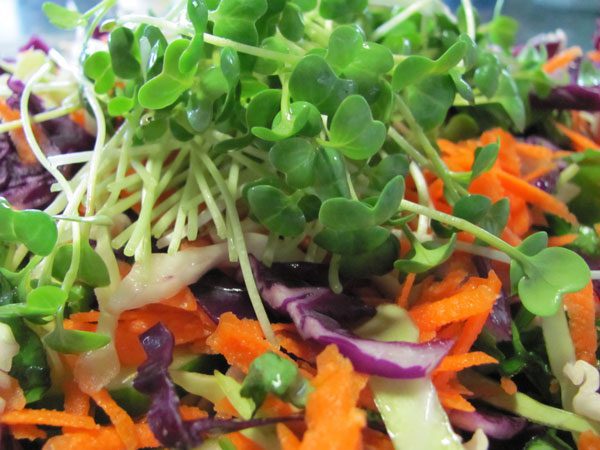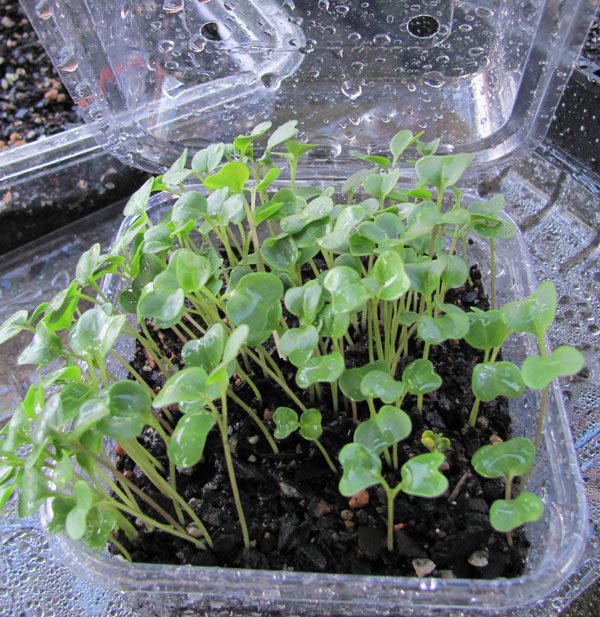This article was originally published in Garden Culture Magazine AUS01, under the title: “Budget Edible Solutions for Urban Micro Gardeners”.
Have you tried growing herbs or veggies only to give up when it doesn’t seem as easy as first thought? Micro gardening is the answer for anyone with limited time, limited space, and less than bountiful sunshine.

The goal of eating healthy homegrown food, becoming more self-reliant, and living more sustainably can sound wonderful in theory but in reality, often presents challenges. Limited space, time, money, and sunlight are just a few issues to contend with. Then there’s learning how to garden, what to grow when and pesky possums pinching your produce.
If it’s all in the ‘too hard basket’, then don’t despair! Start with these easy-to-grow plants get at least some food on the table without the need for garden tools. These ideas only require minimal time and a few basic supplies to start saving money and improving your health.
The easiest plants to grow are those that don’t require gardening skills and only minimum time input, materials, and space. Herbs that grow in a glass of water on a well-lit bench or window sill are an ideal choice.
If you buy spring onions (or you may call them shallots), save your money and regrow them from now on. With a sharp knife, cut your spring onions about 5cm above the root. Use the leaves in your meals but add the stem base and roots to a small glass with 1-2cm of clean water. Change the water daily to prevent bacteria growth, then watch new green leaves grow. Snip with scissors for tasty, free meal additions!

Instead of buying bunches of fresh herbs, propagating your own will save you money and reduce wastage. For example, add leftover stems of mint, lemon balm, rosemary, or basil (with lower leaves removed) to a glass of water. Change water daily. Roots should develop in 2 weeks or less and provide free plants to transplant into a pot for an easy herb garden.

Mint and lemon balm are both shade lovers. Lemon balm tea is a natural anti-depressant, can lift the spirits and relieve morning sickness if drunk with lemon first thing in the morning. Mint has antiseptic, antiviral, and anesthetic properties, and chewing a few leaves can help relieve sore throats, colds, coughs, and headaches. These are great medicinal and culinary herbs to have on hand. Why waste time going to the chemist when you can have healthy alternatives right at home?

Aloe vera is another hardy home pharmacy plant that thrives on neglect, grows well in a sunny spot indoors or outside in a shallow pot, with a well-drained potting mix and occasional watering. Break off a leaf and scrape the gel inside as an aftershave balm or skin moisturizer, to heal burns, soothe stings, bites, rashes, and cuts. Keep cut leaves wrapped in the fridge.
For delicious salad or smoothie ingredients packed with digestive enzymes, microgreens are the perfect solution. These baby greens are healthy ‘fast food’ you can grow from ‘seed to feed’ in just 1-3 weeks depending on seed variety. Add about 2-3cm of moistened seed raising mix to a container with drainage holes (reusing a plastic strawberry punnet is ideal). Adding a sprinkle of rock minerals will boost nutrient value and flavor. Evenly spread a teaspoonful or so of organic herb or vegetable seeds over the mix. Sprinkle a little extra seed raising mix to just cover seeds, mist with water in a spray bottle, and cover with a clear lid. Place in a well-lit area, and mist daily to keep seeds moist until they sprout and grow. Snip with scissors just before adding to meals.